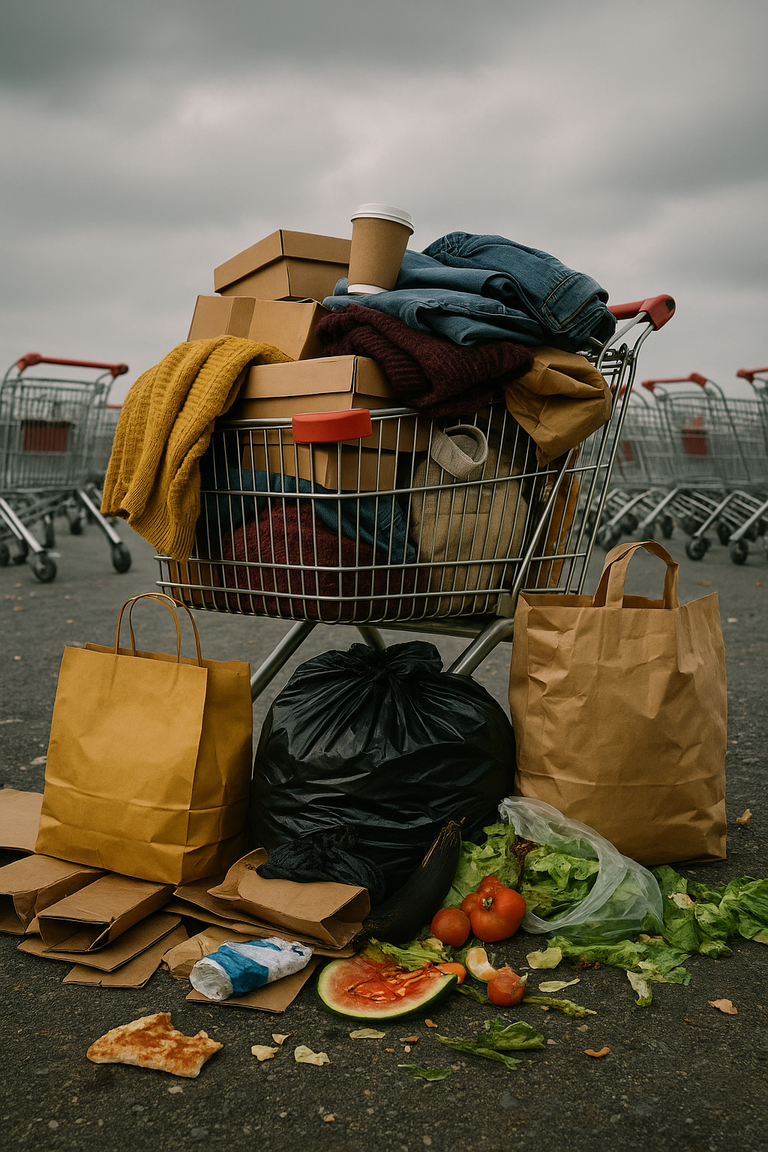Is economic growth still the solution...?
Britain's slow economic growth rate is usually portrayed in the media as a crisis.
The standard line is that our happiness and prosperity are on the line, and this usually means equating personal happiness with limitless consumption.
But one could argue that we have "too much stuff already". For example inn the UK 1.6 billion items of clothing are never worn in our wardrobes, and 10 million tonnes of food are thrown away annually, AND it's hard to argue we're short on material goods. In fact, we might be drowning in them. Whether it's fast fashion, pointless gadgets, or round-the-clock streaming services, our consumer habits seem to have less and less to do with necessity and more to do with habit — or even addiction.
And all this supposedly in the interest of greater economic good. We're led to believe that more spending means more jobs and more growth. But if that spending is driven by advertising pressure, psychological manipulation, and planned obsolescence, the end result is stress, waste, and environmental degradation.

Enough with Growth already...?
Certainly, nobody really wants a return to pre-industrial austerity or scarcity. Nobody is looking to reject modernity, only to redefine how we live with it. What if success was having "enough" — enough food, shelter, security, comfort — but not excess? A community where things are made to last, not to be discarded and replaced annually. A culture where innovation is welcomed for its utility, not as an excuse to "upgrade" incessantly.
Maybe wmight have hit a sweet spot in the early 1990s, before tech-driven consumerism shifted into high gear and shopping became a form of entertainment. That point, fleeting as it was, constituted a vision of balance — a world where material desires were largely fulfilled, but runaway excess had not yet become the norm.
The bigger question is this: relentless growth is not always desirable. It may come at the cost of well-being, community, and the health of the environment. What Britain — and much of the developed world — may now require is not more production, but a shift in values. Less emphasis on GDP, more on quality of life.
Posted Using INLEO
What we should be aiming for is sustainability. We are buying and throwing away more than ever. In two or three generations that will make for a lot more problems that we should not be passing on to our kids and grandkids. We are not making much in this country any more, but that is no excuse as this waste affects the whole world.
If you go back a couple of generations people were happy enough with much less. We don't have to give up all our luxuries though. Stuff is so cheap now that it has become disposable and maybe we should aim to keep things longer. I do try to buy quality where I can.
By building communities that focus on sustainability, durability, and real innovation instead of temporary consumer fads, we can create a more balanced way of living.
Congratulations @revisesociology! You have completed the following achievement on the Hive blockchain And have been rewarded with New badge(s)
You can view your badges on your board and compare yourself to others in the Ranking
If you no longer want to receive notifications, reply to this comment with the word
STOPThe Big boys and think tanks have to figure out a way to consolidate on what has been built. The current economic models most countries operate won't last forever. I believe a modification is possible, and see one happening in the next century or so
Governments tend to want growth as it increases tax revenue. Projections are generally for more spending and tax revenue despite shrinking demographic trends.
Business wants growth as it increases profit through scaling via lower unit costs. As an example, I had a friend who opened up a third restaurant and kept it open despite slow sales as it was enough volume to lower his cost of supplies.
On a personal level, I don't think much thought goes into it beyond more is better.